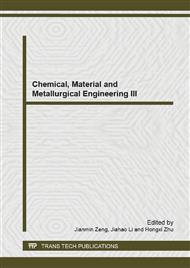p.863
p.867
p.872
p.882
p.889
p.893
p.897
p.901
p.905
Effect of Thermal Finishing on the Mechanical Properties of Hollow Polyester Fiber
Abstract:
The effect of thermal setting parameters namely tensile stress, temperature and time on the breaking strength and breaking elongation of hollow polyester (PET) fiber (PorelTM fiber) were investigated, and their synergistic effect was studied via orthogonal experiment. The results show that protection of fiber wall is an important task during thermal finishing process of hollow fiber. There are direct relationships between micro-molecular structure and mechanical properties. Orthogonal experiment analysis shows that the most significant effect factor for breaking strength and breaking elongation are temperature and tensile stress, respectively. The suggested thermal finishing conditions for PorelTM fiber are summarized as following: elongation (viz. tensile stress) 4%, temperature 165°C, and time 60s.
Info:
Periodical:
Pages:
889-892
Citation:
Online since:
January 2014
Authors:
Price:
Сopyright:
© 2014 Trans Tech Publications Ltd. All Rights Reserved
Share:
Citation:


